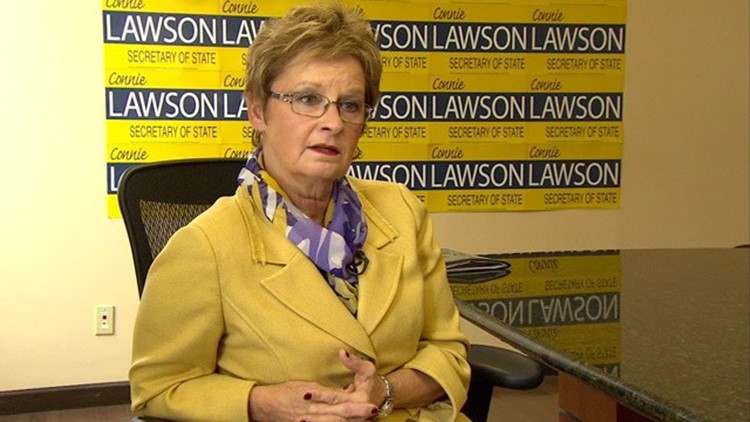INDIANAPOLIS — An edgy America has been warned by its president that the coming election will be “rigged” and “fraudulent.” U.S. intelligence and congressional sources said that nefarious foreign sources are seeking a redux of the 2016 interference, with FBI Director Christopher Wray specifically naming Russia this week. And there has been widespread media speculation that a winner in the presidential race may not be known for days, or even weeks after the Nov. 3 election.
Indiana Secretary of State Connie Lawson, Indiana’s chief election officer, tells Howey Politics Indiana that she has confidence in the process, both in Indiana and nationally. She said in response to written questions from HPI that foreign actors have “scanned” the state’s election systems but likened it to a “burglar rattling doorknobs.”
Lawson said there is “no evidence” of any widespread voting fraud alleged without specifics from President Trump and said that the state’s long-time absentee voting system remains “safe and secure.”
As for when Hoosiers and Americans will learn who won on Nov. 3, she said that counties can begin to count absentee ballots at noon on Election Day.
“My colleagues and I across the nation know just how important it is for Americans to have faith in the electoral process,” Lawson said. “We know there may be some uncertainty on Election Night as we wait for results. We will work together to reassure America that the delay is the result of a change in process and the outcome will reflect the will of American voters.”
Or as former Director of National Intelligence Dan Coats wrote in a New York Times op-ed, “The most urgent task American leaders face is to ensure that the election’s results are accepted as legitimate. Electoral legitimacy is the essential linchpin of our entire political culture.” He called for a bipartisan commission to monitor election conduct.
Last week, the Poynter Institute for Media Studies conducted seminars on what it described as potentially “The Weirdest Election Night Ever.”
Julie Pace, Washington bureau chief for the Associated Press, noted that the wire service has been conducting ballot counting and calling races since 1848 with the introduction of telegraph. She said the AP will be deploying 3,000 people to gather results, monitor swing counties, and conduct exit result polling that will include monitoring early and mail-in voters.
“With mail-in voters, it will be slower,” Pace said. “A slow count doesn’t mean that something has gone wrong.”
Asked about the perception divide between Fox News and CNN, Pace said that “AP is working with Fox as well, using the same data. My expectation is Election Night is going to look the same on Fox as it will on other channels.”
But Cook Political Report National Editor Amy Walter said that “conspiracy theories on social media” will convince some to “believe there is something going on. It does not help that the president of the United States is continually questioning the process.”
Drew McCoy, president of Decision Desk HQ, an election results and data collection and reporting service, said, “When you see lead changes, it’s not like a footrace. The votes are there. The winner is there, we’re just discovering it. It may take longer, but it’s not nefarious.”
Joe Lenski of Edison Research pointed to Florida and North Carolina as swing states “that process large numbers of votes. If you see a clear trend in those two states, we may know on Election Night. If it’s close, it may take days if not weeks.”
When will voters likely know the presidential race winner?
McCoy said, “It’s unlikely on Election Night, but probably sometime Wednesday.” Amy Walter suggested the results will be known “by the weekend,” though she expressed concern about the expected late counting of votes in Pennsylvania.
Secretary Lawson told HPI, “It’s hard to give an exact time. It will come down to how long it takes for counties to count absentee ballots.” She expects that results from Indianapolis won’t be known on Election Day, but expects the other 91 counties will be able to finish on Nov. 3.
Have any nefarious entities tried and/or succeeded in accessing any element – state or local – in the Indiana election system? "The influence campaigns are focused on changing opinions via social media. We do know that our statewide voter registration system (SVRS) is scanned on a regular basis," she said. "We have intrusion detection systems in place to protect SVRS at the state and county level."
Lawson expressed confidence in absentee voting, saying, "Our system is safe and secure. We have checks and balances in place. For in-person absentee voting, often referred to as early voting, voters must show a photo ID. For absentee by-mail, there are bipartisan teams that review the signatures. If there is a discrepancy in signature, the voter is contacted and given the opportunity correct the issue.”
While Lawson believes the U.S. Postal Service can handle the forecasted 1.8 million absentee ballots in Indiana, she said many counties are adding to their absentee ballot counting teams. "I encourage Hoosiers who want to vote by mail to apply for a ballot today and to return their ballot to the county right away,” Lawson advised. “Don’t delay."
The columnist is publisher of Howey Politics Indiana at www.howeypolitics.com. Find Howey on Facebook and Twitter @hwypol.



